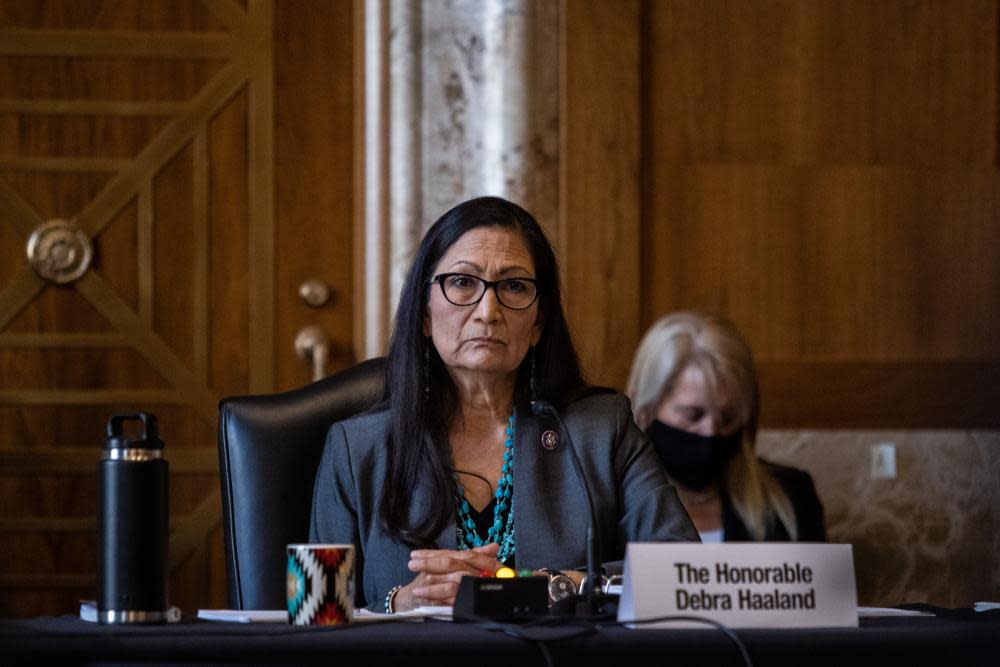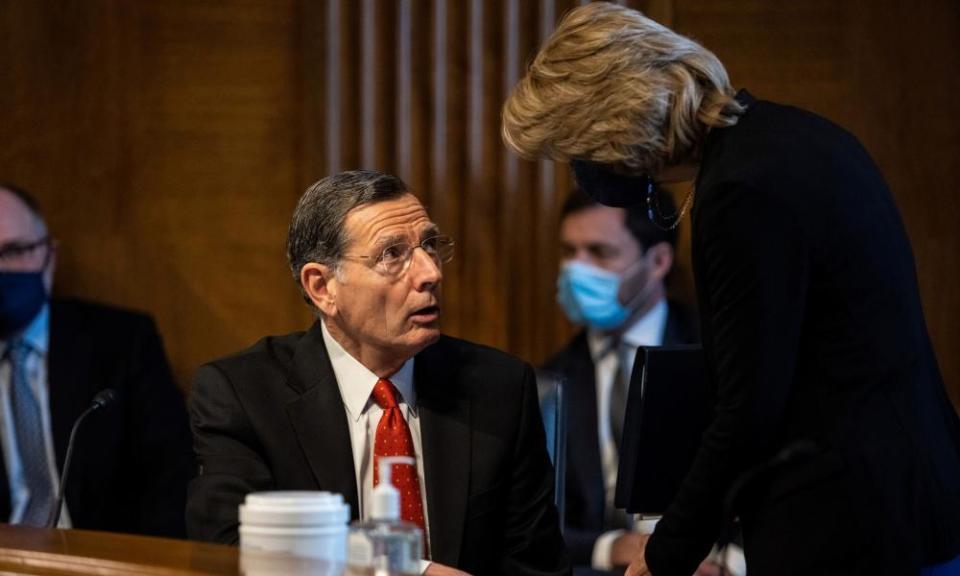Deb Haaland faces hostile Republican questioning in confirmation hearing

- Oops!Something went wrong.Please try again later.
Deb Haaland, seeking to make history as the first Native American to hold a cabinet secretary position in the US, has weathered a torrent of hostile questioning from Republicans during her confirmation hearing as secretary of the interior.
In a striking opening statement, Haaland, a member of Congress for New Mexico, said: “The historic nature of my confirmation is not lost on me, but I will say that it is not about me,” adding that she hoped her elevation would “be an inspiration for Americans, moving forward together as one nation and creating opportunities for all of us”.
A Laguna Pueblo member, Haaland, 60, said she had learned about her culture from her grandmother’s cooking and participating in traditional ceremonies, and had learned about the importance of protecting the environment from her grandfather. Haaland said “our climate challenge must be addressed” but conceded that fossil fuels would play a role in the US for “years to come”.
Haaland is considered a progressive on the climate crisis and has spoken out on the impact of fossil fuel development upon the environment and Native American tribes, positions that Senate Republicans were keen to attack during a sometimes contentious confirmation hearing.
John Barrasso, a Wyoming Republican, criticized Haaland for a tweet from October 2020 in which she stated that “Republicans don’t believe in science”. Barrasso, who has incorrectly said the role of human activity in climate change is “not known” and that ambitious climate action in the form of the Green New Deal would mean “cheeseburgers and milkshakes would become a thing of the past”, said the tweet was “concerning to those of us who have gone through training, believe in science, and yet with a broad brush, we’re all disbelievers”.
Haaland responded to Barrasso, a surgeon, saying: “If you’re a doctor, I would assume that you believe in science”. Scientists have repeatedly said that the US, and the rest of the world, needs to rapidly reduce planet-heating emissions from fossil fuels in order to prevent disastrous heatwaves, flooding and societal unrest associated with runaway climate change.
The early exchange set the tone for more than two hours of questioning where Republicans repeatedly assailed Joe Biden’s decision to pause oil and gas drilling on federal lands as calamitous for jobs. As interior secretary, Haaland would oversee the management of lands that make up nearly a third of America’s landmass, including tribal lands.

At times the questions were extremely pointed, with Bill Cassidy, a Louisiana Republican, asking Haaland: “Will your administration be guided by a prejudice against fossil fuel, or will it be guided by science?” Importantly for the chances for Haaland’s nomination, Joe Manchin, a Democrat who represents the coal heartland of West Virginia, said that he wanted to see the “evolution, not elimination” of coal mining.
Haaland said: “We want to move forward with clean energy, we want to get to net zero carbon” but also struck a conciliatory note with her questioners. The nominee said that changes to energy use “are not going to happen overnight” and that she looked forward to working with the senators. At one point when Steve Daines, a Montana Republican, asked why she supported a bill protecting grizzly bears, Haaland responded: “Senator, I believe I was caring about the bears.”
Haaland had to repeatedly correct Republicans who said Biden had scrapped, rather than paused, oil and gas leases but acknowledged her role as a progressive champion would have to change somewhat if she were confirmed. “If I’m confirmed as secretary, that is far different role than a congresswoman representing one small district in my state,” she said. “So I understand that role, it’s to serve all Americans, not just my one district in New Mexico. I realize being cabinet is very different; I recognize there is a difference in those two roles.”
During later questioning, Haaland raised the disproportionate impact of the Covid-19 pandemic upon Native Americans and raised concerns over tribes such as the Navajo being subjected to polluted water. In a response to a question from the Vermont senator Bernie Sanders about the opening up of an area sacred to native Americans in Arizona to mining, Haaland said she would “make sure that the voice of the tribal nation is heard on the issue”.
Haaland’s nomination has been vigorously supported by environmental and Native American groups as a landmark moment to confront the climate crisis while addressing widespread inequities experienced by tribes.
Bernadette Demientieff, executive director of the steering committee for the Gwich’in people in Alaska, called Haaland a “visionary leader who knows we must protect places sacred to the American people like the Arctic national wildlife refuge.
“Our way of life, our survival is interconnected to the land, water and animals. Today we honor the woman set to be the first Native American in history to fill a presidential cabinet position, and look forward to working with her to ensure that indigenous voices are heard and our human rights respected.”
Nick Tilsen, president and CEO of the NDN Collective, a grassroots indigenous organization, said: “Today we watched Senator Daines mansplain and whitesplain to the Honorable Deb Haaland about public lands and the impacts of poverty – issues he knows nothing about and that Haaland has actual lived and professional experience addressing. These microaggressions and racism on full display only further solidified the need for strong Indigenous Women’s leadership in the highest places of government.”

